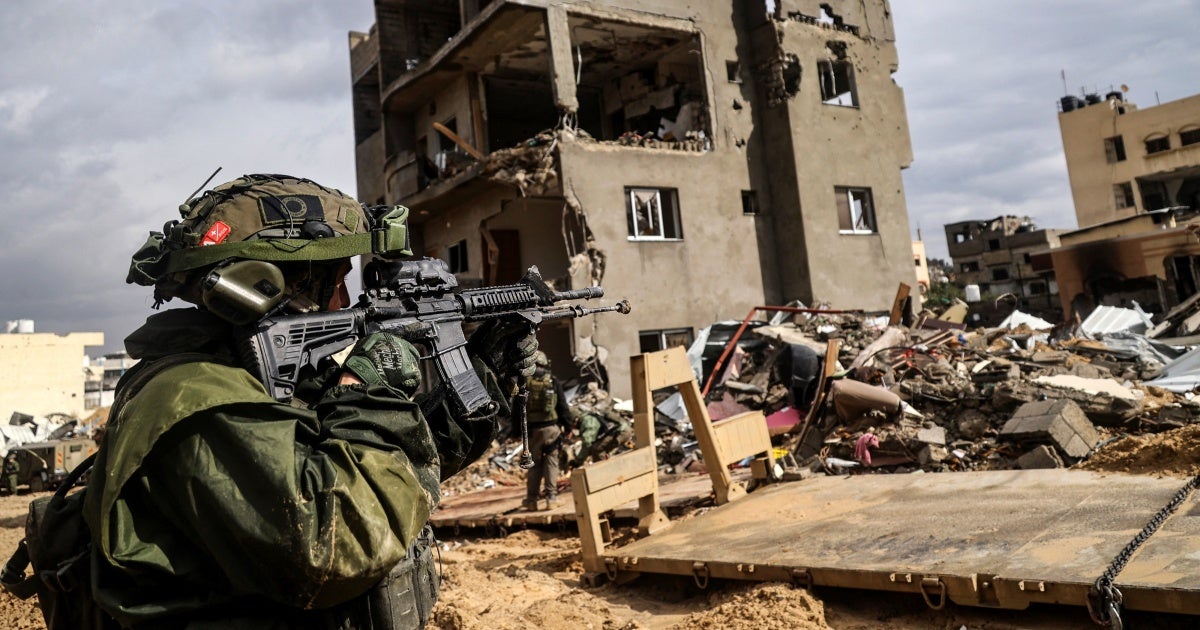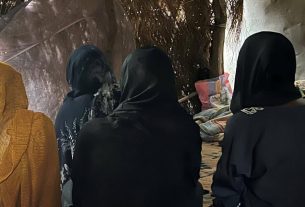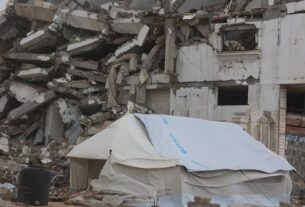(Jerusalem, August 8, 2024) – Israeli forces stormed a Gaza City home on December 21, 2023, throwing grenades inside and opening fire on a room where a civilian family was sheltering, Human Rights Watch said today.
The attack killed seven people, including a pregnant woman, and severely injured two, including a 5-year-old. Witnesses also allege that Israeli forces shot a blind 73-year-old man after securing the building and forcing all other family members out. The incident should be investigated as a possible war crime, and forces involved should be held accountable.
“There is no excuse for soldiers storming into a home full of civilians and firing without precaution,” said Belkis Wille, associate crisis, conflict, and arms director at Human Rights Watch. “They decimated a Palestinian family and orphaned a small child who may never be able to walk again.”
Human Rights Watch interviewed three al-Khalidi family members, two who witnessed the attack and were interviewed over the phone, and in June 2024 they met with Faisal, the injured 5-year-old, in Qatar, where he was receiving medical care. Researchers also analyzed a video uploaded to the Israeli armed forces’ X (formerly known as Twitter) account, IDFonline, parts of which were verified as having been filmed between December 20 and 21. It shows Israeli soldiers and armored vehicles in the vicinity but no ongoing fighting or soldiers coming under fire.
Mohammed al-Khalidi, 40, and Mu’min al-Khalidi, 21, cousins, said that in the night between December 20 and 21, a munition hit a home in Sheikh Radwan, in north Gaza City, near five schools sheltering displaced people. Mohammed, Mu’min, and 29 other family members were in the house next door, having fled their homes following an evacuation phone call from the Israeli military. They said that Mohammed’s sister-in-law Fatma al-Khalidi, 32, who was seven months pregnant, suffered a broken leg during the munition attack.
About 30 minutes after the attack, Mohammed said, Israeli forces arrived with armored vehicles and bulldozers. “We looked out and saw them smashing windows, running over cars with their tanks, destroying electricity lines, destroying everything else they could,” Mohammed said. Many residents of the area fled south, but the al-Khalidis did not, as older family members were unable to flee quickly. Both said no one in the house was armed or had any ties to an armed group, nor did they know of any fighters in the vicinity at the time.
At about noon the following day, both Mu’min and Mohammed said, Israeli forces fired munitions at the first floor of their building. Then, at about 5 p.m., over a dozen Israeli soldiers rammed through the gate into the yard and, without warning or provocation, tossed a grenade through a window of the home’s empty front room. After, Mohammed said, soldiers threw another grenade into the house’s main corridor, proceeded down it, kicked down a door and threw at least 2 more grenades into a room in which 12 people were sheltering, including Mu’min and Mohammed.
Both said when they heard soldiers approaching, they had grabbed their identity documents and were holding them up in their hands. Mu’min said he was injured and fell to the ground against the wall, with his uncle Amjad al-Khalidi, 42, on top of him.
The women screamed and a soldier entered and opened automatic rifle fire on everyone, both men said. Fatma, who was killed, along with her husband, Ahmed, was holding Faisal, who was seriously injured. When the shooting stopped, Fatma’s 6-year-old son, Adam, ran out of the room on seeing his father, Mohammed’s brother, Ahmed al-Khalidi, 34, “lying on the floor in a puddle of blood, like a slaughtered sheep,” Mohammed said. Adam was uninjured.
The cousins said the attack killed seven members of the family: Fatma; Ahmed; Mohammed’s brothers-in-law Shaaban Abu Jabal, 33, and Adham Abu Jabal, 20; and Nawal al-Khalidi, 70, and her children Raed al-Khalidi, 49, and Amjad al-Khalidi.
“One soldier said in Arabic, ‘Whoever is alive, stand up,’” Mohammed said. “I stood and he looked at me and said, ‘You survived, you fucker didn’t you?’ They took me outside and scanned my face with a machine.”
Abd Rabu al-Khalidi, Nawal’s 73-year-old husband, who was blind and uninjured, did not leave the room. Other family members – all children and women – who had been sheltering in a different room were also ordered outside by the soldiers. Mohammed said soldiers strip-searched the surviving men and searched the women and children. They asked where the original residents of the house were, and Mohammed said they didn’t know.
Then, Mohammed said, “We heard bullets being fired inside. I think that’s when they killed whoever had survived inside. They told us, ‘Your last chance to live is to walk in a line behind that soldier.’ We asked, ‘Where are you taking us?’ He said, ‘Shut up and just walk behind him.’”
Mu’min had also been unable to leave the room. “I couldn’t move, and I couldn’t hear anything because the explosions made me temporarily lose my hearing,” he said. “I quickly lost consciousness.” When he came to the next day, he realized he was lying under a pile of bodies.
“There are no words to describe what I felt,” he said. “All I want to know is why? Why did I have to live though such a massacre? Why did I lose all these people? What did we do to deserve all this? There were no resistance fighters in the house, no weapons of any kind, just civilians.”
Metal fragments from the explosion had wounded Mu’min in his knee, calf and foot, and a bullet hit his thigh. He said that when he regained consciousness, he was able to reach for a bottle of water, but soon lost consciousness again, and only was able to revive himself and drag himself out from under the bodies the following day, able only to move his hands. By this point Abd Rabu had been killed, apparently once soldiers reentered the house after evacuating Mohammed and others.
Mohammed found Mu’min when he returned four days later with a doctor to retrieve the bodies. “The legs of Amjad, Raed, and Shaaban had been shattered by the grenade explosion,” Mohammed said. “They looked like mincemeat, and metal fragments had pierced Ahmed in the stomach and neck. I saw Fatma’s belly and face full of metal fragments. Blood was sprayed all over the wall. Adham had a bullet wound that went in through his jaw and exited the back of his head…. Abd Rabu was also dead, with bullet wounds.”
Mohammed said he found over 60 bullet casings in the house.
Faisal had four surgeries in Gaza for ruptured intestines, a punctured bladder, and multiple hip fractures, and three more in Qatar. Six months after the attack, a plaster cast encased him from the waist to the top of his legs. Doctors say he may never walk again. Abdulhafith al-Khalidi, Faisal’s uncle and now his guardian, who accompanied him to Doha, said the attack had dramatically changed the child: “[Faisal] used to be so social and outgoing. He was always independent, running around and talking to new people. He was never afraid. Now if I go to the other room, he starts calling for me. He can never be left alone.”
Mu’min said he has not received clearance to leave Gaza and remains in the north with no medication, his injuries largely untreated, including multiple ruptured tendons.
Surviving al-Khalidi family members identified the house where the attack took place on a map. Human Rights Watch analyzed a video made up of seven clips posted online by the Israeli military on December 24. One shows Israeli forces operating less than 160 meters from the home the al-Khalidis identified.
The Israeli military report accompanying the video said the units appearing in the video are the 13th Shayetet and 401st Brigade. Human Rights Watch established that at least one clip from the video was filmed between the morning of December 20 and late afternoon on December 21. It shows at least 17 Israeli military personnel outside the Al-Taqwa Mosque, 170 meters southwest of the home.
In the same X post, the Israeli military posted a photograph and said it raided a school, which Human Rights Watch located on the opposite side of the street, and found a cache of weapons and explosives. The Israeli authorities have not publicly provided any further information about the attack. Additionally, they did not respond to a July 15 Human Rights Watch letter summarizing its findings and requesting specific information about the incident.
“This incident highlights the deadly cost of Israeli forces’ failure to safeguard, and in some cases to apparently target civilian lives in Gaza, including children,” Wille said. “Other governments should press the Israeli government to end unlawful attacks, and avoid complicity in possible war crimes by halting arms transfers to Israel.”



